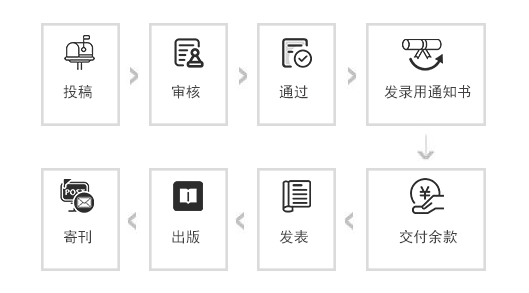PSYCHOPHARMACOLOGY



- 中国知网数据库(CNKI)全文收录期刊
- 中国核心期刊(遴选)数据库收录期刊
- 中国万方数据库全文收录期刊
- 中国维普科技期刊数据库收录期刊
- 中国龙源数据库全文收录期刊
- 中国期刊网全文收录期刊



中国高校科技期刊研究会第9次会员代表大会在北京召开,中宣部出版局副局长张怀海、教育部科学技术与信息化司一级巡视员张国辉等领导出席会议并发表..
英文简介:Official Journal of the European Behavioural Pharmacology Society (EBPS)Psychopharmacology is an international journal that covers the broad topic of elucidating mechanisms by which drugs affect behavior. The scope of the journal encompasses the following fields:Human Psychopharmacology: ExperimentalThis section includes manuscripts describing the effects of drugs on mood, behavior, cognition and physiology in humans. The journal encourages submissions that involve brain imaging, genetics, neuroendocrinology, and developmental topics. Usually manuscripts in this section describe studies conducted under controlled conditions, but occasionally descriptive or observational studies are also considered.Human Psychopharmacology: Clinical and TranslationalThis section comprises studies addressing the broad intersection of drugs and psychiatric illness. This includes not only clinical trials and studies of drug usage and metabolism, drug surveillance, and pharmacoepidemiology, but also work utilizing the entire range of clinically relevant methodologies, including neuroimaging, pharmacogenetics, cognitive science, biomarkers, and others. Work directed toward the translation of preclinical to clinical knowledge is especially encouraged. The key feature of submissions to this section is that they involve a focus on clinical aspects.Preclinical psychopharmacology: Behavioral and NeuralThis section considers reports on the effects of compounds with defined chemical structures on any aspect of behavior, in particular when correlated with neurochemical effects, in species other than humans. Manuscripts containing neuroscientific techniques in combination with behavior are welcome. We encourage reports of studies that provide insight into the mechanisms of drug action, at the behavioral and molecular levels.Preclinical Psychopharmacology: TranslationalThis section considers manuscripts that enhance the confidence in a central mechanism that could be of therapeutic value for psychiatric or neurological patients, using disease-relevant preclinical models and tests, or that report on preclinical manipulations and challenges that have the potential to be translated to the clinic. Studies aiming at the refinement of preclinical models based upon clinical findings (back-translation) will also be considered. The journal particularly encourages submissions that integrate measures of target tissue exposure, activity on the molecular target and/or modulation of the targeted biochemical pathways.Preclinical Psychopharmacology: Molecular, Genetic and EpigeneticThis section focuses on the molecular and cellular actions of neuropharmacological agents / drugs, and the identification / validation of drug targets affecting the CNS in health and disease. We particularly encourage studies that provide insight into the mechanisms of drug action at the molecular level. Manuscripts containing evidence for genetic or epigenetic effects on neurochemistry or behavior are welcome.中文简介:(来自Google、百度翻译)欧洲行为药理学会 (EBPS) 官方杂志 心理药理学是一本国际期刊,涵盖了阐明药物影响行为的机制的广泛主题。该杂志的范围包括以下领域: 人类心理药理学: 实验 本节包括描述药物对人类情绪,行为,认知和生理的影响的手稿。该杂志鼓励涉及脑成像,遗传学,神经内分泌学和发育主题的论文。本节中的手稿通常描述在受控条件下进行的研究,但有时也会考虑描述性或观察性研究。 人类心理药理学: 临床和转化 本节包括针对药物和精神疾病广泛交叉的研究。这不仅包括药物使用和代谢,药物监测和药物流行病学的临床试验和研究,还包括利用整个临床相关方法的工作,包括神经影像学,药物遗传学,认知科学,生物标志物等。特别鼓励将临床前知识翻译为临床知识的工作。本节提交的主要特点是它们涉及临床方面的重点。 临床前心理药理学: 行为和神经 本节考虑有关具有定义的化学结构的化合物对行为的任何方面的影响的报告,特别是当与神经化学作用相关时,在人类以外的物种中。欢迎包含神经科学技术与行为相结合的手稿。我们鼓励在行为和分子水平上提供有关药物作用机制的研究报告。 临床前心理药理学: 翻译 本节考虑使用与疾病相关的临床前模型和测试来增强对中枢机制的信心的手稿,该机制可能对精神病患者或神经系统患者具有治疗价值,或者报告临床前操作和挑战有可能被翻译到临床。还将考虑基于临床发现 (反向翻译) 的旨在完善临床前模型的研究。该杂志特别鼓励整合目标组织暴露,分子靶标活性和/或目标生化途径调节的措施。 临床前心理药理学: 分子,遗传和表观遗传 本节重点介绍神经药理学药物/药物的分子和细胞作用,以及影响健康和疾病中枢神经系统的药物靶标的鉴定/验证。我们特别鼓励在分子水平上深入了解药物作用机制的研究。欢迎包含遗传或表观遗传对神经化学或行为影响的证据的手稿。










英文简介:Official Journal of the European Behavioural Pharmacology Society (EBPS)Psychopharmacology is an international journal that covers the broad topic of elucidating mechanisms by which drugs affect behavior. The scope of the journal encompasses the following fields:Human Psychopharmacology: ExperimentalThis section includes manuscripts describing the effects of drugs on mood, behavior, cognition and physiology in humans. The journal encourages submissions that involve brain imaging, genetics, neuroendocrinology, and developmental topics. Usually manuscripts in this section describe studies conducted under controlled conditions, but occasionally descriptive or observational studies are also considered.Human Psychopharmacology: Clinical and TranslationalThis section comprises studies addressing the broad intersection of drugs and psychiatric illness. This includes not only clinical trials and studies of drug usage and metabolism, drug surveillance, and pharmacoepidemiology, but also work utilizing the entire range of clinically relevant methodologies, including neuroimaging, pharmacogenetics, cognitive science, biomarkers, and others. Work directed toward the translation of preclinical to clinical knowledge is especially encouraged. The key feature of submissions to this section is that they involve a focus on clinical aspects.Preclinical psychopharmacology: Behavioral and NeuralThis section considers reports on the effects of compounds with defined chemical structures on any aspect of behavior, in particular when correlated with neurochemical effects, in species other than humans. Manuscripts containing neuroscientific techniques in combination with behavior are welcome. We encourage reports of studies that provide insight into the mechanisms of drug action, at the behavioral and molecular levels.Preclinical Psychopharmacology: TranslationalThis section considers manuscripts that enhance the confidence in a central mechanism that could be of therapeutic value for psychiatric or neurological patients, using disease-relevant preclinical models and tests, or that report on preclinical manipulations and challenges that have the potential to be translated to the clinic. Studies aiming at the refinement of preclinical models based upon clinical findings (back-translation) will also be considered. The journal particularly encourages submissions that integrate measures of target tissue exposure, activity on the molecular target and/or modulation of the targeted biochemical pathways.Preclinical Psychopharmacology: Molecular, Genetic and EpigeneticThis section focuses on the molecular and cellular actions of neuropharmacological agents / drugs, and the identification / validation of drug targets affecting the CNS in health and disease. We particularly encourage studies that provide insight into the mechanisms of drug action at the molecular level. Manuscripts containing evidence for genetic or epigenetic effects on neurochemistry or behavior are welcome.中文简介:(来自Google、百度翻译)欧洲行为药理学会 (EBPS) 官方杂志 心理药理学是一本国际期刊,涵盖了阐明药物影响行为的机制的广泛主题。该杂志的范围包括以下领域: 人类心理药理学: 实验 本节包括描述药物对人类情绪,行为,认知和生理的影响的手稿。该杂志鼓励涉及脑成像,遗传学,神经内分泌学和发育主题的论文。本节中的手稿通常描述在受控条件下进行的研究,但有时也会考虑描述性或观察性研究。 人类心理药理学: 临床和转化 本节包括针对药物和精神疾病广泛交叉的研究。这不仅包括药物使用和代谢,药物监测和药物流行病学的临床试验和研究,还包括利用整个临床相关方法的工作,包括神经影像学,药物遗传学,认知科学,生物标志物等。特别鼓励将临床前知识翻译为临床知识的工作。本节提交的主要特点是它们涉及临床方面的重点。 临床前心理药理学: 行为和神经 本节考虑有关具有定义的化学结构的化合物对行为的任何方面的影响的报告,特别是当与神经化学作用相关时,在人类以外的物种中。欢迎包含神经科学技术与行为相结合的手稿。我们鼓励在行为和分子水平上提供有关药物作用机制的研究报告。 临床前心理药理学: 翻译 本节考虑使用与疾病相关的临床前模型和测试来增强对中枢机制的信心的手稿,该机制可能对精神病患者或神经系统患者具有治疗价值,或者报告临床前操作和挑战有可能被翻译到临床。还将考虑基于临床发现 (反向翻译) 的旨在完善临床前模型的研究。该杂志特别鼓励整合目标组织暴露,分子靶标活性和/或目标生化途径调节的措施。 临床前心理药理学: 分子,遗传和表观遗传 本节重点介绍神经药理学药物/药物的分子和细胞作用,以及影响健康和疾病中枢神经系统的药物靶标的鉴定/验证。我们特别鼓励在分子水平上深入了解药物作用机制的研究。欢迎包含遗传或表观遗传对神经化学或行为影响的证据的手稿。
来稿要求:
论点新颖、论证严密、论据充足、文字精练。论文字数:5000字符-8000字符为宜,图表也要计算在内,不包括英文摘要关键词。
标 题:
文章标题要言简意赅,30字以内。作者署名:署真实姓名,注明作者单位、单位所在省市和邮政编码。摘 要:要用第三人称概括全文,300字以内。
关 键 词:
用3~8个关键词术语反映论文主题。专用符号:名词、术语、数字、计量单位、标点符号和数学符号等,必须符合国家标准;外文人名、地名和术语需译成中文。
图表格式:
文中插图与表格放在相应正文之后,分别按出现顺序用图1、图2或表1、表2统一编号。插图应为黑白色,其序号、标题及注释居中放在图的下方,表格的序号及标题置于表格上方,表注放在表格的下方(建议:由于篇幅限制,除核心期刊外尽量不用或少用图表)。
正文注释:
采用尾注形式,注释号①,②,③等标在相应正文右上角。
章节体例:
章节标题为:一级标题不编号,用黑体居中排,二级标题不编号,用楷体放在相应的文字段首与正文空一字格接排正文。 三级标题分别用1.2.3.顺序编号。文中接排标题用(1),(2)编号。
参考文献:
参考文献置于正文之后,近5年的不少于3条,用[1],[2]……顺序编号,如文章中有内容需要解释请用尾注形式。参考文献不全者不能进入审稿阶段。{参考文献格式如下:(1)图书:作者.书名(版本)[M].出版所在地: 出版社,出版年:(1)页码.
(2)期刊:作者.题目[J].期刊名,年,卷(期):页码.
(3)电子参考文献:作者.题目[OL].(文章的发表日期).[本文引用日期].作者简介:来稿者请附个人简介,内容包括姓名(出生年—),性别,籍贯,民族,学历,工作单位,职称,研究方向,通讯地址,联系电话及电子信箱。
一般情况下,您将在3个工作日内收到审稿结果。如文章有很强的时效性,请说明需要最晚刊发时间。
| 论文编号 | 作者姓名 | 论文题目 | 录用情况 |
|---|---|---|---|
| TG251-13579 | 韩丽炘 孟涛 温娟娟 刘晓琴 | 基于互联网的CBL+TBL教学法在病理学实验教学中的应用 | 已录用 |
| TG251-13681 | 邹隆强 杨清余 钟鸿路 李正南 陈 | 医学运动康复联合消肿止痛方治疗急性踝关节扭伤临床研究 | 已录用 |
| TG251-13794 | 林雨慧 陈霄雯 郑颖彦 朱永凯 贾 | 基于SWOT模型的儿童专科医院临床研究发展策略分析 | 已录用 |
| TG251-13762 | 郑鸿雁 | 重复经颅磁刺激治疗肝脾不调型功能性肛门直肠痛的临床研究 | 已录用 |
| TG251-13891 | 袁召1 赵会谢2 赵海深3 | 真武汤治疗阳虚水泛型慢性心力衰竭患者的临床研究 | 已录用 |
| TG251-13536 | 王杰1 张蕾蕾2 | 血脂和载脂蛋白水平与分化型甲状腺癌及其病理学特征的相关性探究 | 已录用 |
| GD24-5203 | 单一青 高鹏慧 姚瑶 | 思维导图护理对宫颈癌患者行腹腔镜术后康复的影响 | 已录用 |
| GD24-5217 | 林秀娟 梁静文 刘美仙 陈惠贤 | 加速康复外科管理模式在胸腔镜肺段切除术患者围手术期护理中的应用效果 | 已录用 |
| GD24-5213 | 杨素雯 何洁芳 陈妙霞 廖景升 | 健康行为改变整合理论对于宫颈癌晚期放疗患者依从性及自我效能的影响 | 已录用 |
| GD24-5199 | 杨月惠 王凤婷 | 个体护理计划在心脏瓣膜置换手术围手术期患者中的应用 | 已录用 |
邮箱:cnkibianjibu@163.com
QQ:
扫码联系: